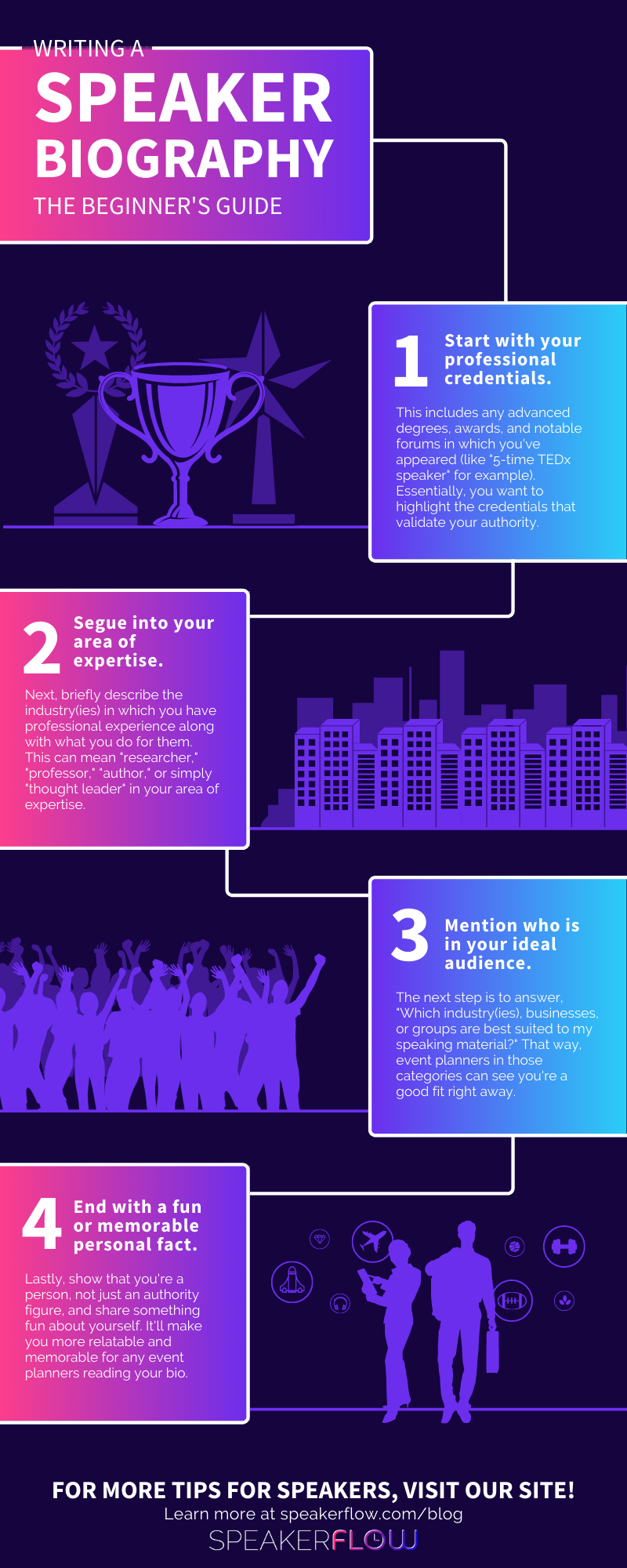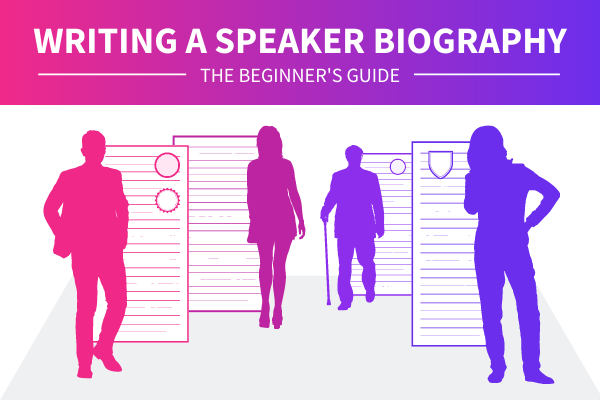When it comes to writing a speaker biography for the first time, it’s easy to be at a loss. What information is most important to include in a speaker biography? Should you be expected to write a custom biography for every event? Why do you even need one in the first place?
All of these questions are valid, especially if you’re a new speaker or if you’re turning your part-time speaking business into a full-time career. In the latter case, it’s also especially important that you nail your speaker biography as early as possible. Although you’ll almost inevitably have to edit it from time to time, fine tuning the bulk of it will present you in the best light as you approach event planners for speaking engagements. Plus, the more work you put in initially, the more editing time you’ll save in the long run.
In light of these reasons to write a speaker biography – and how tricky it can be to do so, if you don’t know where to start – let’s jump into the details!
Why do you need a speaker biography?
First and foremost, writing a speaker biography is about providing information. When an event planner is considering hiring you, they want to know your background. Among other things, they’re likely asking themselves, as they review their speaker options:
- Which of these speakers has the most professional experience in my industry?
- Who has the most speaking experience in my industry?
- Who is the most qualified to speak, relative to their speaking fees?
- And who has the most attention-grabbing backstory or speaking style (to keep my audience engaged)?
In answering each of these questions, event organizers will eventually meet with the speaker(s) they deem most qualified for their event. However, before they narrow down their options, your bio is the first step in making you stand out. For each of the aforementioned questions, your bio can shout “I am!” and make you the obvious choice.
Consequently, writing a speaker biography carefully and deliberately can translate directly into revenue. Even if it’s not the winning feature of your speaking business (because, let’s face it, that’s you!) it can play a big role in catching planners’ attention and showing your audiences that you know your sh*t. That way, even before you step on stage, they’re interested and ready to listen.
What do you include in a speaker biography?
The next question is arguably the biggest: When writing a speaker biography, what information should you include? Ultimately, there’s no all-encompassing answer to this, as every speaking business is different. But there are a few major details that are undeniably important. Below, we’ll break down the top four of these “major details,” so you can start writing your bio as efficiently as possible.
Start with your professional credentials.
Any awards, advanced degrees, or professional acknowledgements are the first way to present yourself as an authority in your bio. These include educational credentials, such as a Bachelor’s or Master’s degree, a PhD, or an honorary degree or doctorate. They also include any notable job positions you’ve held, any “big-name” clients you’ve worked with, and any awards you’ve earned as a professional speaker. Two of the most common speaking awards, for instance, are the Certified Speaking Professional (CSP) and Council of Peers Award for Excellence (CPAE) certifications from the National Speakers Association (NSA).
Segue into your area of expertise.
Next, expand upon your professional credentials and accomplishments to explain your focus. Although it should be succinct, this section should highlight the industry(ies) in which you have experience and, by extension, authority. It should also give the reader a greater understanding of your role in these areas, outside of your awards. A few common words, referring to the writer of the bio, include “professor,” “author,” “researcher,” or “thought leader.” Whatever words you choose, the goal is simply to describe which industries you help and what roles you’ve held as you helped them in the past.
Mention who is in your ideal audience.
After specifying your focus industries, get specific about who you help within those industries. Are you most passionate about bringing whole teams together? Would you rather focus on C-suite executives or other high-ranking employees? Do you prefer working with non-profits organizations, large corporations, small businesses, or all of the above? All of these details help event organizers see whether they are or are not a good fit for your programs from the beginning. This saves them – and you – the time of meeting when it ultimately isn’t going to work out. And, on the flip side, if you’re a perfect match, event organizers will be able to know so immediately. Win, win!
End with a fun or memorable personal fact.
Lastly, make sure to end your speaker bio with a bang. It can be a powerful catchphrase or statement (as we’ll see in Julie Holmes’s bio below). It can also be a fun note about your hobbies or your personal life. Mine, for example, ends with “When she’s not at her desk, you can find Cece in the woods of her home state, Minnesota, or enjoying a whiskey old fashioned with Taylorr, (SpeakerFlow’s CEO).” Essentially, this section is intended to make you more relatable and memorable, so event organizers want to contact you after they’re done reading.
Summarily, when writing a speaker biography, each of these components should support your credibility. Even though you’re using your bio in the context of speaking, remember: you’re an expert first and a speaker second. They should also, combined, paint a picture of who you are and how much you have to offer. In that way, event organizers will not only see that you’re professionally qualified for their event but also amazing to work with. How could someone not want to call you after reading that, right?
[hubspot type=cta portal=5815852 id=7cff95fd-a207-455b-aed4-9364f424f159]
How long should a speaker biography be?
Generally, speakers provide a few different versions of their biography for event organizers to choose from. These include a full bio, covering everything we mentioned above, and a 100-word bio for use on programs or on print materials with limited space. Additionally, some speakers provide a “super short” version that’s around 50 words. That way, if the event organizer is mentioning them on their website or a social post (somewhere the reader can click if they want to see the full bio), they can still hook the reader with a sentence or two about the speaker.
Should a speaker biography be in first or third person?
Depending on where it will appear, the suitable perspective to use when writing a speaker biography, may vary. A good rule of thumb is to create two versions of your bio – one in first person perspective and one in third person. Then, ask the event organizer which they prefer for their specific needs.
To help you prepare in the meantime, below are a few common situations and which perspective to use in the biography for each one.
- News/Press Appearance: third person
- Podcast Appearance: third person
- Guest Author on a Blog: third person
- Your Speaking Website: first person (if you’re a solopreneur or want to be more personable) or third person (if you manage a team or want to be formal)
- Your Speaker Kit: third person (although most speakers also start their kit with an “Intro Letter,” which is in first person)
How is a speaker biography different from a speaker introduction?
When at a speaking event, it’s also important to remember when a biography is appropriate versus your pre-written speaker introduction. To put it simply, while your bio should build your credibility, your intro should build excitement and anticipation for your speech. Because it’s almost always read by a member of the event staff or the group to which you’re speaking, this means that your intro should be clear, concise (30-60 seconds to read aloud), and crafted with the tone of the event in mind. It should also be specific to your audience and, unlike your bio, always edited prior to the event. This allows you to write an intro that captures audience members’ attention and demands respect. Conversely, your speaker biography will likely remain similar from event to event. Unlike your intro, it’s intended as background information so it can be much longer and detailed.
Speaker Biography Examples
At this point, we’ve covered a lot of “do”s and “don’t”s about writing a speaker biography, but one thing we haven’t talked about is examples. Because every speaker is unique, it doesn’t make sense to copy another speaker’s bio word-for-word. However, considering the following bio examples, there are undeniably useful components for you to mimic in your own.
1. Ozan Varol
First on our list, the following speaker biography belongs to Ozan Varol. This bio originates from Ozan’s website and describes, in detail, most of the components we mentioned above. Because it’s part of a publicly accessible platform, it also includes a clear call to action at the end, urging event organizers to reach out. When publishing your bio on your own website, including a similar directive can help you turn website visitors into leads, too.
Ozan’s Biography:
Ozan Varol is a rocket scientist turned award-winning professor and author. A native of Istanbul, Turkey, Ozan grew up in a family of no English speakers. He learned English as a second language and moved to the United States by himself at 17 to attend Cornell University and major in astrophysics.
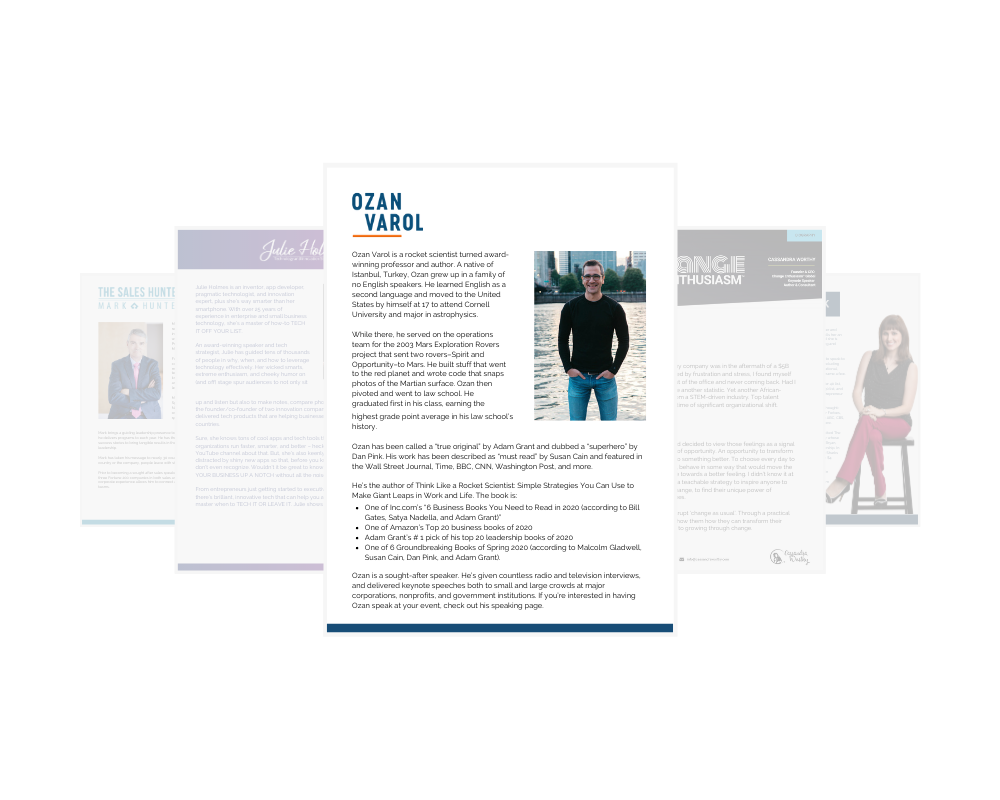
While there, he served on the operations team for the 2003 Mars Exploration Rovers project that sent two rovers–Spirit and Opportunity–to Mars. He built stuff that went to the red planet and wrote code that snaps photos of the Martian surface. Ozan then pivoted and went to law school. He graduated first in his class, earning the highest grade point average in his law school’s history.
Ozan has been called a “true original” by Adam Grant and dubbed a “superhero” by Dan Pink. His work has been described as “must read” by Susan Cain and featured in the Wall Street Journal, Time, BBC, CNN, Washington Post, and more.
He’s the author of Think Like a Rocket Scientist: Simple Strategies You Can Use to Make Giant Leaps in Work and Life. The book is:
- One of Inc.com’s “6 Business Books You Need to Read in 2020 (according to Bill Gates, Satya Nadella, and Adam Grant)”
- One of Amazon’s Top 20 business books of 2020
- Adam Grant’s # 1 pick of his top 20 leadership books of 2020
- One of 6 Groundbreaking Books of Spring 2020 (according to Malcolm Gladwell, Susan Cain, Dan Pink, and Adam Grant).
Ozan is a sought-after speaker. He’s given countless radio and television interviews, and delivered keynote speeches both to small and large crowds at major corporations, nonprofits, and government institutions. If you’re interested in having Ozan speak at your event, check out his speaking page.
2. Cassandra Worthy
Next up is the speaker biography for Cassandra Worthy. Like Ozan’s, Cassandra’s bio below appears on her website, making it appropriate that it’s short and easy to read. However, compared to the others in this list, Cassandra’s bio is the only one to appear in first person perspective everywhere, including her speaking materials. It’s also the only one written more like a letter than a bio, so if you’re looking for a similarly casual but impactful way to share your story, Cassandra’s bio is a good example to follow.
Cassandra’s Biography:
Hi! I am Cassandra.
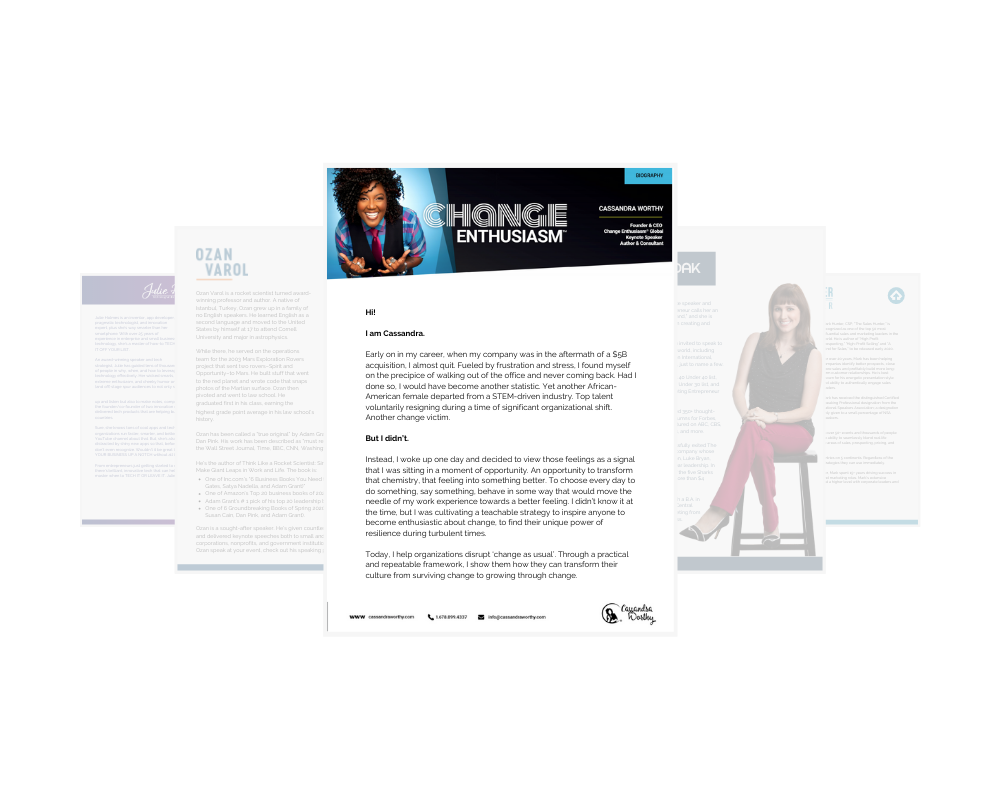
Early on in my career, when my company was in the aftermath of a $5B acquisition, I almost quit. Fueled by frustration and stress, I found myself on the precipice of walking out of the office and never coming back. Had I done so, I would have become another statistic. Yet another African-American female departed from a STEM-driven industry. Top talent voluntarily resigning during a time of significant organizational shift. Another change victim.
But I didn’t.
Instead, I woke up one day and decided to view those feelings as a signal that I was sitting in a moment of opportunity. An opportunity to transform that chemistry, that feeling into something better. To choose every day to do something, say something, behave in some way that would move the needle of my work experience towards a better feeling. I didn’t know it at the time, but I was cultivating a teachable strategy to inspire anyone to become enthusiastic about change, to find their unique power of resilience during turbulent times.
Today, I help organizations disrupt ‘change as usual’. Through a practical and repeatable framework, I show them how they can transform their culture from surviving change to growing through change.
3. Brittany Hodak
Third of our speaker biography examples is that of Brittany Hodak. As an experienced marketer and speaker, Brittany’s bio checks all of the boxes. Credentials? Check. Area of expertise? Check. Notable past clients and news appearances? Check and check. In short, Brittany’s bio does an exceptional job of establishing her authority and, by extension, selling her thought leadership offerings. Ideally, your bio should do the same.
Pro Tip: Brittany also offers short and “super short” versions of her bio on her website in addition to the full version below. Visit her “Meeting Planners” page to learn more. 👌
Brittany’s Biography:
Brittany Hodak is an international keynote speaker and award-winning business leader. Entrepreneur calls her an “expert at creating loyal fans for your brand,” and she is widely regarded as the “go-to source” on creating and retaining superfans.
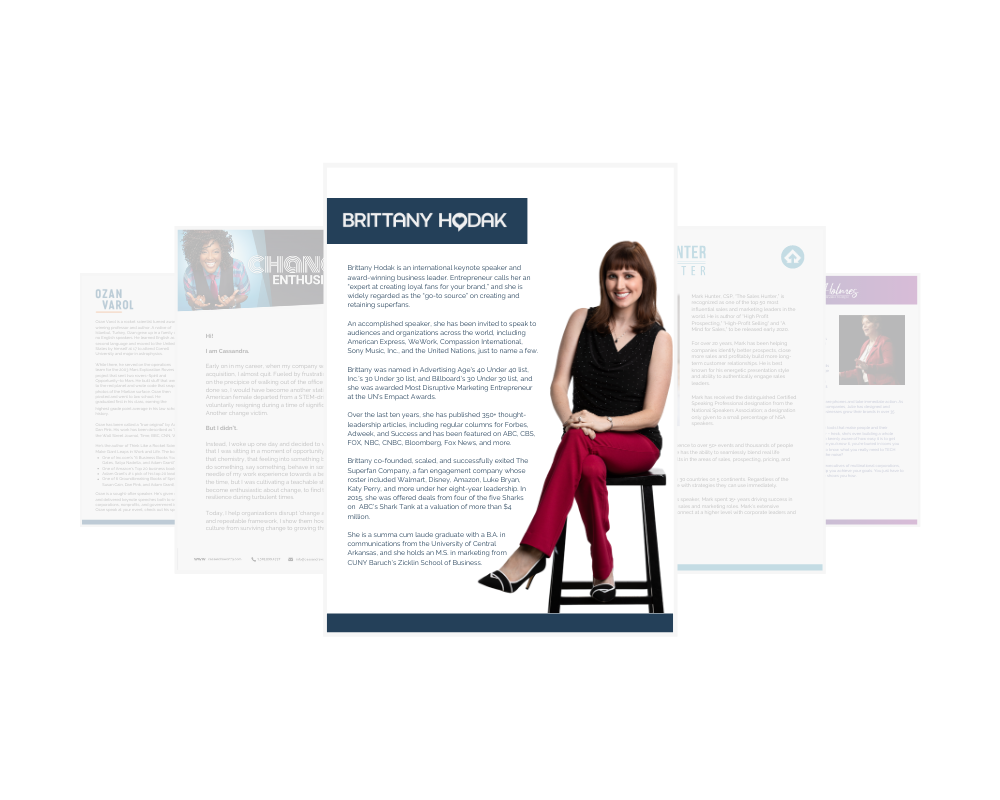
An accomplished speaker, she has been invited to speak to audiences and organizations across the world, including American Express, WeWork, Compassion International, Sony Music, Inc., and the United Nations, just to name a few.
Brittany was named in Advertising Age’s 40 Under 40 list, Inc.’s 30 Under 30 list, and Billboard’s 30 Under 30 list, and she was awarded Most Disruptive Marketing Entrepreneur at the UN’s Empact Awards.
Over the last ten years, she has published 350+ thought-leadership articles, including regular columns for Forbes, Adweek, and Success and has been featured on ABC, CBS, FOX, NBC, CNBC, Bloomberg, Fox News, and more.
Brittany co-founded, scaled, and successfully exited The Superfan Company, a fan engagement company whose roster included Walmart, Disney, Amazon, Luke Bryan, Katy Perry, and more under her eight-year leadership. In 2015, she was offered deals from four of the five Sharks on ABC’s Shark Tank at a valuation of more than $4 million.
She is a summa cum laude graduate with a B.A. in communications from the University of Central Arkansas, and she holds an M.S. in marketing from CUNY Baruch’s Zicklin School of Business.
4. Mark Hunter
The fourth speaker biography in our list belongs to renowned sales speaker and author Mark Hunter. As far as bios go, Mark’s is a great example of how to keep things short and sweet while also showcasing your skills. Like Cassandra’s, it also breaks Mark’s information into short paragraphs so it’s easier to read (and remember). Additionally, like Brittany’s, it showcases Mark’s business “by the numbers” for an eye-catching mention of his accomplishments. Likewise, your own bio doesn’t have to be long or use flowery language to show your skill. It just has to be clear and packed with the most impressive facts about you.
Mark’s Biography:
Mark Hunter, CSP, “The Sales Hunter,” is recognized as one of the top 50 most influential sales and marketing leaders in the world. He is author of “High Profit Prospecting,” “High-Profit Selling” and “A Mind for Sales,” to be released early 2020.
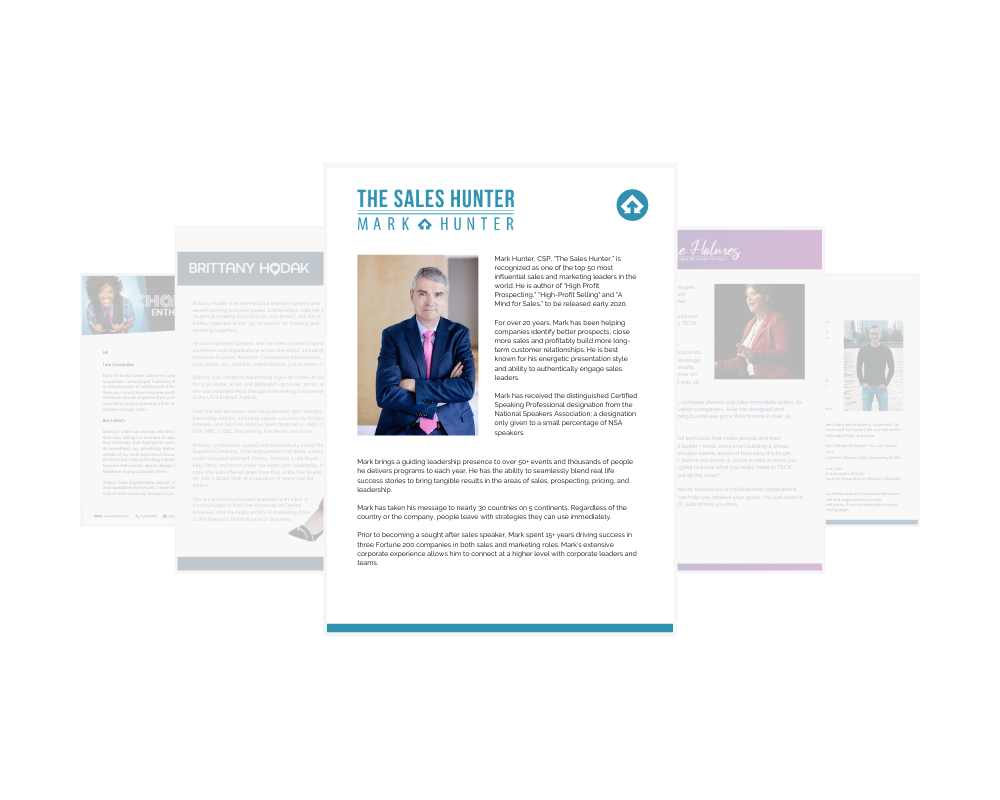
For over 20 years, Mark has been helping companies identify better prospects, close more sales and profitably build more long-term customer relationships. He is best known for his energetic presentation style and ability to authentically engage sales leaders.
Mark has received the distinguished Certified Speaking Professional designation from the National Speakers Association; a designation only given to a small percentage of NSA speakers.
Mark brings a guiding leadership presence to over 50+ events and thousands of people he delivers programs to each year. He has the ability to seamlessly blend real life success stories to bring tangible results in the areas of sales, prospecting, pricing, and leadership.
Mark has taken his message to nearly 30 countries on 5 continents. Regardless of the country or the company, people leave with strategies they can use immediately.
Prior to becoming a sought after sales speaker, Mark spent 15+ years driving success in three Fortune 200 companies in both sales and marketing roles. Mark’s extensive corporate experience allows him to connect at a higher level with corporate leaders and teams.
5. Julie Holmes
The last of our speaker biography examples comes from innovation and technology expert Julie Holmes. As a speaker, Julie knows better than most the importance of getting your point across in every aspect of your brand. She also knows the role of brandable phrases in building a speaking business. In the bio below, we see this in her use of the word “tech,” which replaces various other words (like “check” or “take”) to further highlight her technological expertise and her sense of humor. In the same way, consider using language in your own bio that communicates your personality and the purpose of your brand.
Julie’s Biography:
Julie Holmes is an inventor, app developer, pragmatic technologist, and innovation expert, plus she’s way smarter than her smartphone. With over 25 years of experience in enterprise and small business technology, she’s a master of how-to TECH IT OFF YOUR LIST.
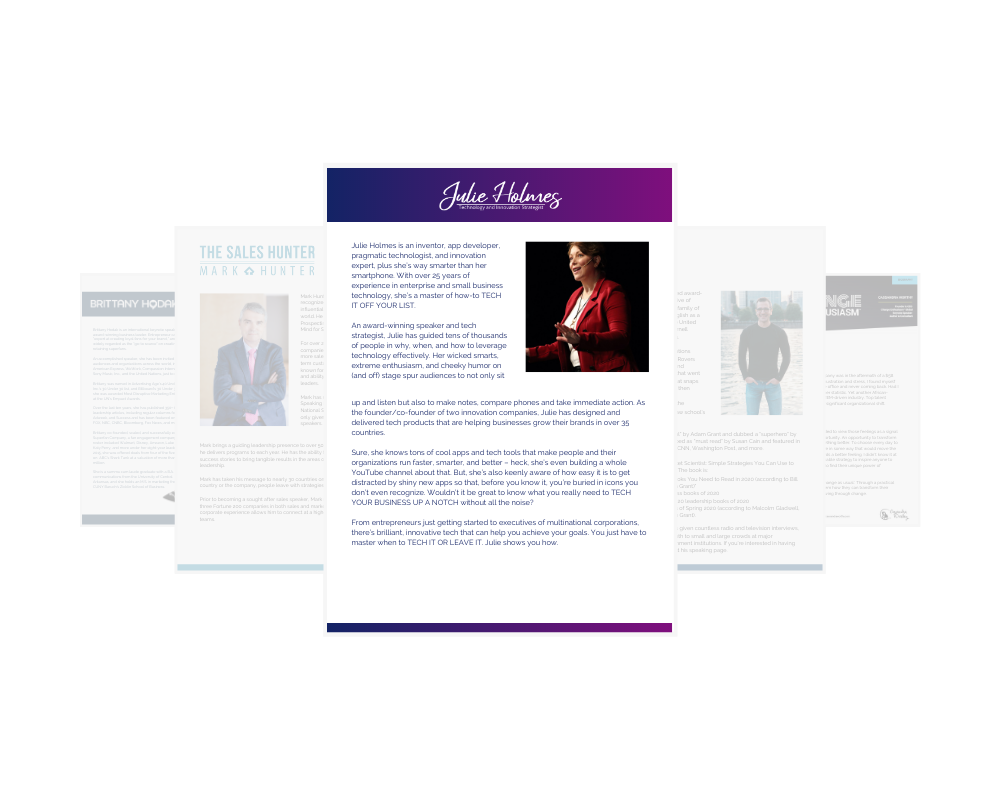
An award-winning speaker and tech strategist, Julie has guided tens of thousands of people in why, when, and how to leverage technology effectively. Her wicked smarts, extreme enthusiasm, and cheeky humor on (and off) stage spur audiences to not only sit up and listen but also to make notes, compare phones and take immediate action.
As the founder/co-founder of two innovation companies, Julie has designed and delivered tech products that are helping businesses grow their brands in over 35 countries.
Sure, she knows tons of cool apps and tech tools that make people and their organizations run faster, smarter, and better – heck, she’s even building a whole YouTube channel about that. But, she’s also keenly aware of how easy it is to get distracted by shiny new apps so that, before you know it, you’re buried in icons you don’t even recognize. Wouldn’t it be great to know what you really need to TECH YOUR BUSINESS UP A NOTCH without all the noise?
From entrepreneurs just getting started to executives of multinational corporations, there’s brilliant, innovative tech that can help you achieve your goals. You just have to master when to TECH IT OR LEAVE IT. Julie shows you how.
Conclusion
Hopefully, with this guide, you’ll be able to tackle writing a speaker biography with confidence, if you haven’t already. For more examples, check out our previous article, “10 Speaker Bio Examples That Will Inspire You To Update Yours.”
Additionally, for technology designed to support your business, check out our operating system! With customized modules and integrations and an extensive onboarding process, SpeakerFlow’s system is all about efficiency, so you can more easily run your speaking business and enjoy more time on stage. Book a demo to learn more. 👍
